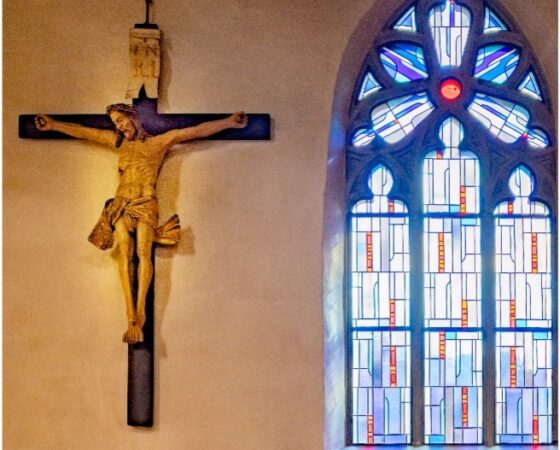Good Friday | 29 March 2024 | Sermon on John 18:1—19:42 | Paul Bieber |
The Passion of Our Lord Jesus Christ According to St. John
also
Isaiah 52:13—53:12
No Longer Hidden
Grace, mercy, and peace to you, from God our Father and from our Lord and Savior Jesus Christ.
This evening we are in the middle of this one Liturgy that stretches across three evenings. We have forgiven one another and heard the absolution of the confession of sin we made all the way back on Ash Wednesday. We have heard again the new commandment of love and have washed one another’s feet. We have celebrated the institution of the Eucharist, transferred the consecrated elements to the altar of repose, and stripped the main altar of its paraments. And that was just the beginning.
In the night in which he was betrayed, Jesus interpreted what was to befall him on the following day, Good Friday, with the commandment that we love one another as he loves us, and with the gift of his body and blood, given and shed for us. This evening we are not called to interpret the event of the cross. That has been done. It was, in fact, already done when the prophet Isaiah penned the fourth song of the suffering servant, our Old Testament reading this evening.
Lifted up, the servant is both degraded and exalted. He is disfigured, despised, and rejected: a man of suffering. He is beset by suffering for sickness not his own. He bears our infirmities and diseases—our sins—takes them and carries them. People hide their faces from this. Some praise his ethical teaching, say that he was a good man, apply his example to social problems. But they hide their faces from his cross and passion—the true work of Christ.
It is hard to look at: He was wounded—pierced—for our transgression, crushed for our iniquities. Not our mistakes, our slips, our shortcomings, but sins against God’s law. “Who was the guilty?” we sing, “who brought this upon thee?” “’Twas I, Lord Jesus.” Being pierced and crushed is the punishment he bears for us, all of us who, like lost sheep, have gone profoundly astray. There is a way and we have not walked in it. Instead, we have walked away from God’s call, which we are only able to hear as accusation. We’re not just lost, we’re hiding, caught in the brambles of our sin.
That is why it was the will of the Lord God to crush him. Those who put him to death are responsible for their actions, but they were doing only what God permitted them to do. All this happened by the will of God—for us. The punishment Jesus bore for us actually sets us free in the sight of the holy God. We are healed and made whole. Jesus’ cross brings an actual end to the wrath under which we live, and actual stop to the accusing voice of God’s law.
The passion of the Christ is the authentic and entire account of God reconciling us—at his own cost—and of our reconciliation. Only the God from whom we are alienated can put an end to our separation from him. If we could receive this God and trust his self-giving, the divine wrath would be satisfied. It is God’s wrath, and only God can end it. So God gives himself in such a way that he recreates us—dead in our sins, no people at all—to be his own people, living in our trust of his self-giving love.
There is no other story or theory behind this story. We are called to live this story, receiving the gift of God, our reconciliation, as we hear Isaiah and the St. John Passion, as we pray, as we venerate the cross, as we receive the presanctified gifts of his body and blood, given and shed for us. Jesus has given his all for us. The divine self-giving in Jesus raises up the new person who receives, who believes. Since the problem is God’s absence from us, the solution is his presence for us in the concrete event of the cross, given for us in Holy Communion, as we proclaim the Lord’s death until he comes.
Jesus’ death brings finality to his earthly life, making his promises—his life, his teaching, his healing—into an irrevocable testament. We heard last Sunday in St. Mark’s account of the Passion how dreadful was the death he died. But the servant lifted up is not only degraded, but also exalted, and St. John’s account reminds us that no one actually took Jesus’ life from him. He actually laid it down of his own accord, so that we might believe the new testament in his blood, and trust his royal and irrevocable promises.
In his arrest, in the interrogation by the religious authorities, in the trial before Pilate, even when he is lifted up, Jesus is what the titulus on the cross says he is: the king. In his presence as we hear this story, we find ourselves in the story. We perceive these scenes as events in God’s life and ours. By Jesus’ self-offering, God is reconciled to us. For our part, we need not hide our faces anymore. We are brought back again as on every Good Friday to the charcoal fire: Are you one of this man’s disciples?
In the name of the Father and of the Son and of the Holy Spirit. Amen.
—
The Rev. Dr. Paul Bieber
San Diego, California, USA
E-Mail: paul.bieber@sbcglobal.net

